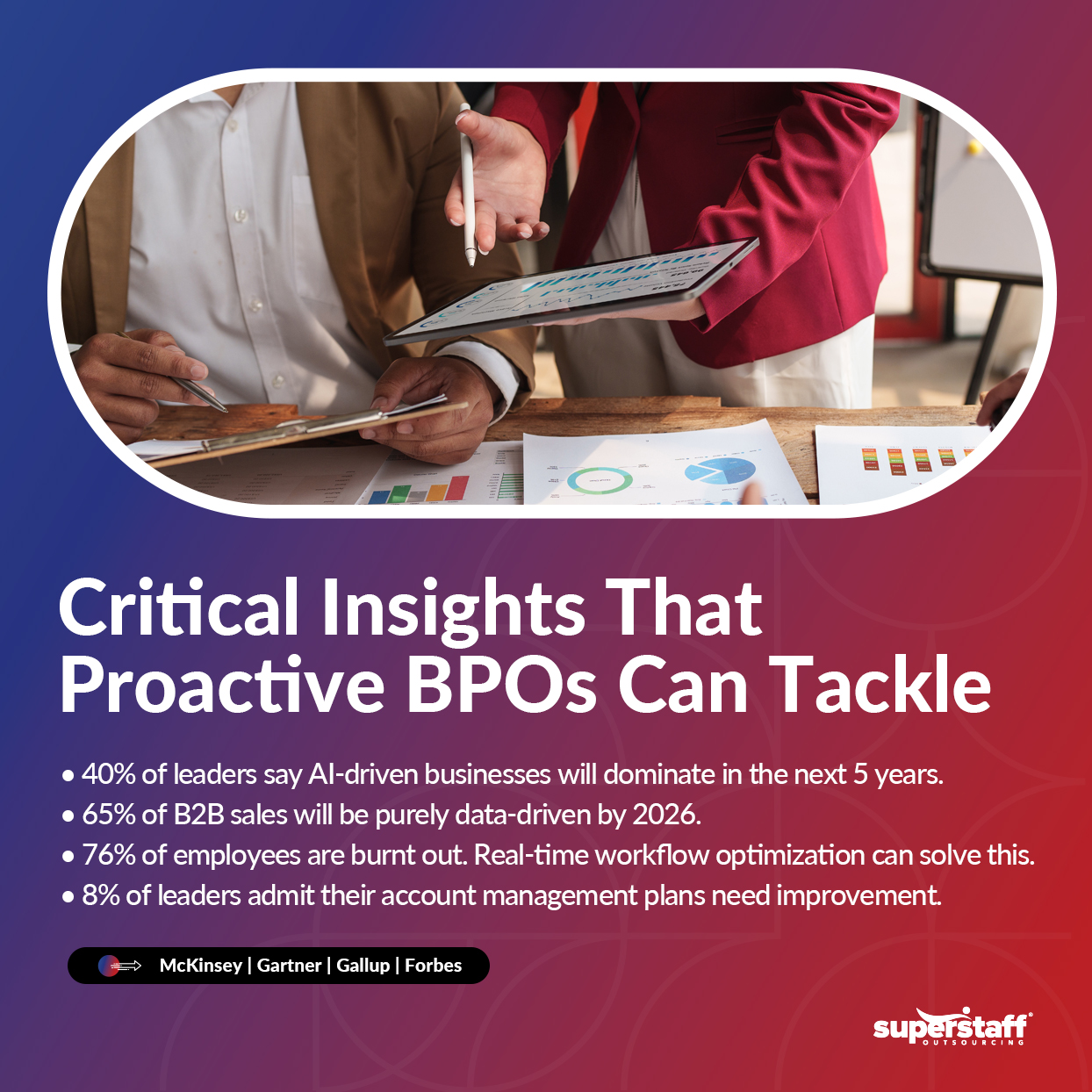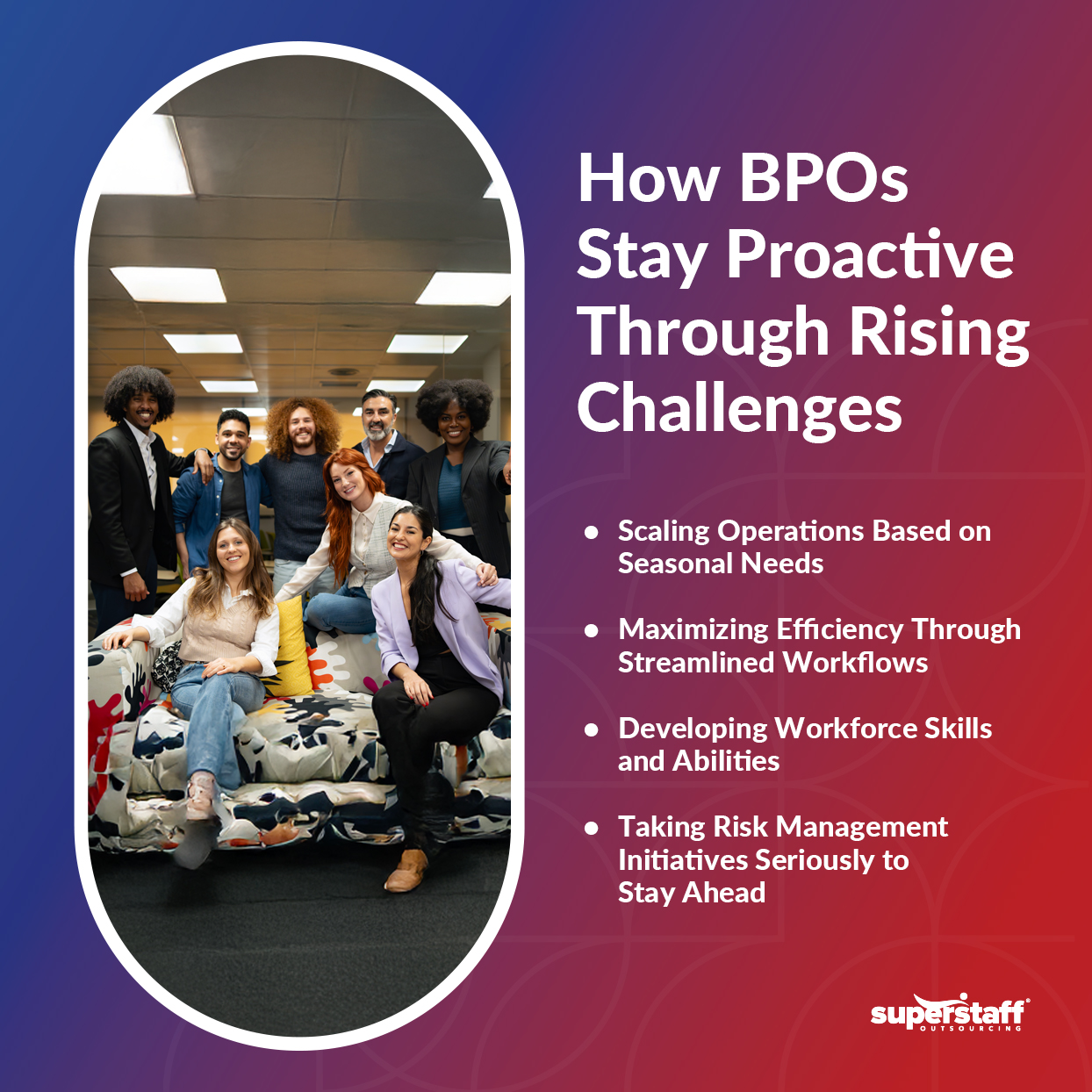
What if your business could resolve issues before they even surface?
The business landscape is very competitive and rapid-paced. Knowing that disruptions can cost millions and shake customer trust, staying ahead of the competition is both an advantage and extremely necessary. This is why you should think outside the box by not limiting yourself to outsourcing operations; partnering with Business Process Outsourcing (BPO) providers can anticipate your challenges before they escalate.
A proactive BPO partner handles customer service or back-office service solutions using data, real-time monitoring, and expert insights to detect risks early, solve issues before they impact operations, and create a seamless experience for your business and your customers.
In this blog, we will explore how the right outsourcing provider transforms from a service provider into a strategic ally, ensuring your business stays resilient, agile, and ready for any challenge ahead. Let’s begin.
Data-Driven Insights: How A BPO Partner Anticipates and Addresses Challenges

Reactivity is no longer enough. You need partners who can spot challenges before they become costly disruptions. A proactive BPO provider uses data-driven insights to do precisely that, leveraging analytics to predict and prevent operational setbacks before they impact service quality, customer satisfaction, or business performance.
Identifying Patterns Before Problems Emerge
Data isn’t going anywhere. According to McKinsey, 40% of business leaders like you agree that data and AI-driven organizations are here to stay in the next 5 years. That being said, a proactive BPO does more than track key performance metrics. They continuously analyze customer behavior, operational trends, and historical data to detect subtle patterns indicating a developing issue. As examples:
- Customer Sentiment Analysis: By monitoring customer interactions, feedback, and complaint trends, your BPO partner can identify recurring issues that signal broader service gaps. Addressing these proactively prevents escalations and improves your customer experience.
- Call Volume Forecasting: Unexpected spikes in customer inquiries can overwhelm teams and lead to longer response times. A proactive BPO anticipates these fluctuations and ensures the proper staffing levels and resources are in place to maintain service consistency.
- Operational Efficiency Tracking: By examining agent performance metrics, such as average handling time and first-call resolution rates, your outsourcing provider can uncover inefficiencies, streamline workflows, and prevent potential service bottlenecks before they arise.
Transforming Insights into Action
Raw data alone needs to be processed and analyzed. What sets a proactive BPO partner apart is its ability to turn data into insights and immediate, strategic action. Once patterns are identified, the next step is implementing preventive solutions, such as:
- Adjusting staffing models to align with projected demand fluctuations.
- Enhancing agent training to address recurring customer pain points.
- Refining internal workflows to eliminate inefficiencies before they create bottlenecks.
This data-first approach ensures that your business reacts to issues and actively prevents them by maintaining seamless operations and elevating service quality. The following proactive strategy is implementing real-time monitoring.
Real-Time Monitoring: Immediate Action to Emerging Challenges
In an environment where business conditions shift rapidly, waiting for issues to surface is not viable. An outsourcing provider proactively handles service disruptions while they continuously monitor KPIs and customer interactions, allowing you to address challenges as they emerge. With real-time data, BPOs can instantly adjust strategies, ensuring uninterrupted service and optimal operational performance.
Why Real-Time Monitoring Matters
To connect this to data analytics, let’s go back a bit. According to Gartner, data-driven decisions are estimated to become larger for 65% of B2B sales by 2026. Constant monitoring is key to maintaining high service standards, and real-time monitoring alongside data can prevent oversights. A proactive BPO provider leverages advanced tracking systems to detect anomalies before they escalate into full-blown operational setbacks. This approach includes:
- KPI Surveillance: By monitoring key performance indicators such as response times, customer satisfaction scores, and resolution rates, a BPO can identify minor deviations that could indicate more significant issues on the horizon.
- Live Customer Interaction Analysis: By reviewing live interactions, call sentiment analysis, chat transcripts, and social media feedback, they help detect shifts in customer behavior and pinpoint emerging service concerns.
- Agent Productivity and Workload Balancing: According to Gallup, about 76% of employees feel burnt out at their jobs. By analyzing workload distribution in real-time, agents can instantly reallocate resources, preventing burnout, minimizing wait times, and ensuring efficiency across all support channels.
Turning Insights into Immediate Action
Monitoring alone is not enough. What separates an outsourcing provider from a standard provider is its ability to act swiftly and effectively based on real-time insights. Key interventions include:
- Scaling Resources Instantly: If call volumes spike due to a product recall or a marketing campaign, a proactive BPO can immediately reassign agents or increase staffing to prevent service delays.
- Adjusting Communication Strategies: If real-time sentiment analysis detects an uptick in negative feedback, leadership can intervene with improved messaging or faster issue resolution.
- Enhancing Workforce Efficiency: Live data helps optimize agent workflows, reducing unnecessary hold times and ensuring customers receive prompt, informed responses.
By integrating real-time monitoring with immediate problem resolution, a proactive outsourcing organization mitigates risks and fortifies its clients against operational disruptions. This ensures that your business maintains service excellence, no matter the challenge.
Dedicated Account Management: Personalized & Proactive Solutions
The one-size-fits-all approach does not work in outsourcing. Every business, including yours, has unique challenges, operational goals, and customer expectations. That is why a proactive BPO company invests in dedicated account management, ensuring every client of yours receives tailored solutions that align with your industry, business model, and long-term strategy.
According to Forbes, 8% of leaders say their account management plans do not work. This fact emphasizes the importance of having a dedicated account management team, which BPOs understand.
Beyond Standard Support: The Value of a Dedicated Account Manager
A dedicated account manager (AM) is more than a point of contact. They act as an extension of your team, proactively identifying challenges and optimizing solutions before disruptions occur. Their roles include:
- Deep Business Understanding: AMs immerse themselves in a client’s operations, industry trends, and competitive landscape to anticipate future needs rather than simply reacting to current issues.
- Proactive Problem-Solving: By continuously assessing performance data and market shifts, AMs can recommend strategic adjustments that prevent inefficiencies, improve service delivery, and enhance customer satisfaction.
- Customized Service Adaptation: No two businesses operate the same way. AMs collaborate with internal teams to adjust workflows, integrate new technologies, and implement best practices that align with each client’s priorities.
Industry-Specific Expertise
Not all outsourcing challenges are universal. A proactive partner that assigns dedicated account managers with industry-specific expertise can provide more innovative, more relevant solutions. Examples include:
- E-commerce and Retail: Managing seasonal spikes in order volumes, customer inquiries, and returns by adjusting staffing levels and service protocols in advance.
- Healthcare and Biopharmaceuticals: Ensuring compliance with industry regulations while enhancing patient support and back-office processing efficiency.
- Technology and Support: Streamlining Tier 1 and Tier 2 technical support processes to maintain customer satisfaction and product adoption rates.
Aligning BPO Services with Business Goals
A dedicated account management model strengthens client-BPO alignment by creating a collaborative partnership rather than a transactional service relationship. This ensures:
- Regular Performance Reviews: Frequent data-driven discussions to refine service strategies and improve key metrics.
- Strategic Scaling: Predictive insights that help businesses adjust support functions as they expand or pivot.
- More assertive Communication: A centralized, knowledgeable point of contact who understands business priorities and drives continuous improvement.
By integrating dedicated account management into its framework, a BPO partner becomes your true strategic ally. It provides personalized, proactive solutions that go beyond simple service delivery to drive long-term success. Now, let’s explore scalable solutions.
Scalable Solutions: Supporting Clients During Peak Times

Business demands are rarely static. Seasonal surges, market fluctuations, and unexpected spikes in customer inquiries can strain your internal teams, leading to service delays and operational bottlenecks. A proactive outsourcing partner provides scalable solutions, allowing you to navigate high-demand periods seamlessly without compromising service quality or efficiency.
The Strategic Advantage of Scalability
Scaling has been proven to work. Data by McKinsey reveals that 60% of scaling initiatives help starting businesses succeed. A BPO that can quickly scale resources ensures that your business can remain agile and responsive, no matter how the demand shifts. Scalability is about workforce capacity while having the proper infrastructure, technology, and operational framework to support your fluctuating business needs. This includes:
- Flexible Workforce Expansion: The ability to ramp up agent support during peak seasons, product launches, or unexpected surges ensures uninterrupted service.
- AI-Driven Demand Forecasting: By leveraging predictive analytics, a BPO can anticipate periods of high activity and proactively allocate resources before demand escalates.
- Multi-Channel Support Optimization: Customers can use multiple communication channels during peak periods. A scalable BPO adjusts staffing levels across voice, chat, email, and social media to maintain fast response times.
Proactive Adaptation to High-Demand Scenarios
A forward-thinking outsourcing partner integrates workforce agility with real-time monitoring and process efficiency, ensuring businesses can handle:
- Seasonal Demand Surges: Whether it’s the holiday rush for e-commerce brands or tax season for financial services, a BPO can preemptively train and onboard additional staff to meet volume spikes.
- Crisis and Event-Driven Spikes: Product recalls, marketing campaigns and unforeseen market shifts can trigger increased customer engagement. A scalable BPO ensures that service levels remain stable without disrupting internal operations.
- Global Time Zone Coverage: Expanding support hours or launching 24/7 customer service outsourcing ensures round-the-clock availability, especially for companies serving international markets.
Scalability is about growth, resilience, and continuity. But scalability alone is not enough. To sustain long-term success, businesses must also optimize their internal processes to ensure peak performance at all times.
Process Optimization: Streamlining Operations to Maximize Efficiency
According to PwC, 73% of leaders are using AI to streamline their business operations. Efficiency is the backbone of any successful outsourcing partnership. A proactive outsourced partner continuously refines your operations to eliminate inefficiencies, enhance productivity, and ensure seamless service delivery. Process optimization is not a one-time initiative but an ongoing strategy that keeps workflows agile, reduces friction, and maximizes performance.
Refining Workflows for Predictable and Scalable Efficiency
A BPO must integrate structured optimization techniques that fine-tune daily processes to create a high-performing operational environment. This includes:
- Identifying and Eliminating Bottlenecks: A proactive BPO detects operational slowdowns through data analysis and performance reviews and restructures workflows to enhance speed and accuracy.
- Automation Where It Matters: Strategic automation reduces repetitive tasks without diminishing human oversight, ensuring teams focus on high-value interactions and problem-solving.
- Reducing Error Rates and Rework: By refining processes and implementing quality assurance checkpoints, businesses benefit from consistent accuracy in data processing, customer interactions, and back-office functions.
Continuous Improvement Through Performance Analysis
Process optimization is a cycle, not a one-time fix. The best-outsourced teams in the business integrate performance analytics into their operations, ensuring ongoing enhancements by:
- Benchmarking Against Industry Standards: Regular comparisons with top-tier competitors and internal performance goals drive sustained improvements.
- Leveraging Real-Time Feedback: Monitoring customer interactions and operational outcomes allows BPOs to make data-driven adjustments quickly.
- Cross-Departmental Collaboration: Ensuring all teams, customer service, technical support, and back-office work within optimized workflows that complement each other, reducing inefficiencies.
A well-optimized process improves day-to-day operations and enhances a business’s long-term adaptability. However, even the most efficient workflows require skilled professionals who can adapt to industry changes, new technologies, and evolving customer expectations. That is why ongoing skill development is critical to a proactive BPO strategy.
Ongoing Skill Development: Building an Adaptive and Future-Ready Workforce
A BPO’s effectiveness is only as strong as its people. Even the most advanced systems and streamlined workflows mean little without skilled professionals who can think critically, solve problems efficiently, and adapt to shifting business landscapes. Studies by Talent LMS showed that 66% of employees actively seek new skills for their work. A proactive partner prioritizes continuous skill development, ensuring its workforce evolves alongside client needs, industry trends, and technological advancements.
Strategic Training to Keep Teams Ahead of Industry Shifts
A forward-thinking BPO does not rely on outdated training models. Instead, it implements structured, ongoing development programs that keep employees sharp, engaged, and equipped with the latest competencies. This includes:
- Industry-Specific Upskilling: Training agents to understand complex regulations, compliance standards, and customer expectations unique to each industry, whether healthcare, fintech, retail, or SaaS.
- Technology Integration and Digital Fluency: Ensuring teams are proficient in using AI-driven tools, automation platforms, and omnichannel communication systems to optimize customer engagement and back-office support.
- Advanced Problem-Solving Techniques: Teaching employees to anticipate client pain points and respond with efficient, scalable solutions aligned with business objectives.
Fostering Agility Through Continuous Learning
A static workforce is a liability in an industry where client expectations constantly evolve. An outsourcing company cultivates a culture of continuous learning by:
- Providing Leadership and Soft Skills Training: Developing critical thinking, communication, and decision-making skills ensures employees contribute beyond transactional tasks.
- Encouraging Cross-Functional Expertise: Rotational training programs allow employees to gain exposure across departments, creating well-rounded professionals who can handle diverse responsibilities.
- Investing in Certification and Professional Growth: Supporting employees in obtaining relevant certifications ensures a workforce that is credible, competitive, and committed to excellence.
While skill development ensures teams stay ahead of business demands, preparing for potential disruptions requires a different level of foresight. To truly protect business continuity, a proactive partner must have a robust risk management framework in place, anticipating challenges before they become roadblocks.
Robust Risk Management: Safeguarding Operations from Disruptions
Digital threats and disruptions are inevitable. Based on Gartner’s data back in 2022, they foresaw that by 2025, 45% of businesses will face cyber attacks. With the knowledge of digital attacks in mind, it’s best to prepare and safeguard early than wait for that inevitability to appear.
Unforeseen challenges can disrupt even your most well-structured business operations. From sudden market shifts to cybersecurity threats and operational bottlenecks, a BPO partner goes beyond reacting to problems; they anticipate and prevent them from happening. A proactive risk management framework ensures stability, resilience, and continuity, no matter the challenge.
Predicting Risks Before They Impact Operations
Risk management is about foreseeing potential vulnerabilities and addressing them before they escalate. A BPO that takes risk thoughtfully integrates:
- Comprehensive Risk Assessments: Regular evaluations of operational weaknesses, security threats, and compliance gaps allow businesses to avoid potential disruptions.
- Scenario-Based Forecasting: Analyzing past incidents and industry-specific risks to develop predictive models that flag potential threats before they arise.
- Regulatory Compliance and Data Security: Ensuring adherence to global compliance standards (e.g., GDPR and HIPAA) mitigates risks associated with data handling, privacy breaches, and legal liabilities.
Implementing Contingency Plans for Uninterrupted Service
Even with the best predictive measures, some disruptions are unavoidable. A proactive BPO partner ensures business continuity through structured contingency planning, including:
- Disaster Recovery Protocols: Well-documented, tested recovery strategies allow businesses to maintain essential operations during unexpected events, such as system failures or cyberattacks.
- Multi-Site and Remote Workforce Capabilities: If one location experiences disruptions, operations can seamlessly transition to another support center or remote workforce without downtime.
- Crisis Response Teams: Trained professionals specializing in rapid problem resolution, ensuring minimal impact on service levels and customer experience.
By integrating risk mitigation into its core strategy, outsourcing becomes your operational safeguard, ensuring you remain firm and resilient. Risk management alone is not enough, though. The actual value of a proactive BPO partnership lies in its ability to go beyond problem-solving and become a long-term strategic ally for you.
Take The Proactive Approach With An Excellent BPO Partner Like SuperStaff
A proactive BPO business partner provides support while becoming an extension of your team. They leverage data-driven insights, real-time monitoring, dedicated account management, scalable solutions, process optimization, ongoing skill development, and risk management to ensure smooth, uninterrupted operations.
At SuperStaff, we take a forward-thinking approach to outsourcing seriously. We anticipate challenges before they impact your business and deliver tailored solutions that align with your goals. Whether you need customer support, back-office optimization, or industry-specific expertise, our team is ready to help you stay ahead of the curve and secure you in the competitive business environment.
Let’s build a more brilliant, resilient, and proactive operation together; connect with SuperStaff today!






